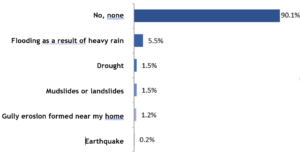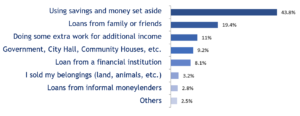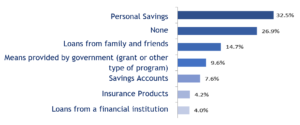By Martha Recinos, Specialist of Public Policy and Financial Innovation, Banco Central de Reserva de El Salvador (BCR).
Coordinated solutions and international cooperation are key to addressing the climate change emergency and the detrimental impact it has on vulnerable sectors of the population. Sustainable finance has proved pivotal in this regard, leading to the development of green roadmaps and action plans in many Latin American countries. El Salvador is a case in point where a wealth of research is being done to feed into, what will soon be, the country’s first Inclusive Green Finance (IGF) roadmap.
In 2022, the Banco Central de Reserva de El Salvador (BCR) conducted an AFI-funded National Survey on Access and Use of Financial Products and Services. The survey aimed to assess the current level of financial inclusion in the country through information collected from its adult population. What made the research particularly significant, was that it was the first survey in the Latin American region to include a section on Inclusive Green Finance¹. The survey served to update the findings of a similar 2016 AFI-funded survey.
The main objectives of the survey included:
- Identifying climate events that affect Salvadorans and how these impact their sources of income.
- Estimating income losses resulting from climate events.
- Determining the period required to recover loss of income from climate events.
- Identifying mechanisms used by Salvadorans to cope financially with the impact of climate change, including savings, insurance, loans from financial institutions, loans from informal actors, help from relatives, and others.
- Determining if Salvadorans are aware of green financial products and services like green credit, green insurance, and green investment funds, among others.
- Evaluating Salvadorans’ interest in green financial products and services.
- Identifying factors preventing Salvadorans from acquiring green financial products (economic, cultural, and others).
Below is an overview of the survey based on the aforementioned objectives:
1. Climate-related events in El Salvador from August 2021 to August 2022
The survey indicated that 90.1 percent of Salvadorans have not been affected by any significant weather events in the past 12 months. 5.5 percent stated that they’ve experienced flooding from rainfall; 1.5 percent were affected by drought and landslides; 1.2 percent dealt with gullies forming near their homes; while 0.2 percent experienced earthquakes.
Natural hazard events experienced in the last 12 months

*Source: BCR (2022). National Survey on Access to and Use of
Financial Products and Services.
2. Economic losses caused by climate-related events
Climate-related events can have negative effects on household finances. Of the 9.9 percent of Salvadorans surveyed who reported having experienced climate-related events, 52 percent faced a significant decrease in their source of income as a result, with older adults and lower-income individuals being the most affected. The respondents who suffered economic losses due to climate events incurred an average expense of US$501.
3. Mechanism for coping with climate impact
Information was collected on how respondents have dealt with expenses and losses generated by climate-related events. The findings indicated that 43.8 percent of the surveyed individuals used their savings; 19.4 percent requested loans from family or friends; 11 percent were forced to take on extra work to earn additional income; while 9.2 percent stated they received assistance from the government, their local municipality, community centers, etc. Additionally, 8.1 percent sought loans from financial institutions, 2.8 percent obtained loans from informal lenders, and 3.2 percent reported selling their belongings (including land, animals, etc) to overcome climate-related losses or expenses.
How to economically cope with climatic events

**Source: BCR (2022). National Survey on Access to and Use of
Financial Products and Services.
4. Knowledge of green products and services
Only 9 percent of respondents indicated familiarity with green financial products and services like green credit, green insurance, green investment funds, and green savings accounts, among others.
The survey also revealed that most Salvadorans depend on personal savings and loans from family or friends to protect their businesses and assets from climate-related events. Only a very small percentage indicated making use of green products and services like savings accounts, insurance products or green loans to build up resilience against climate change. The two main reasons provided by 26 percent of respondents were that they either could not afford green products and services (63%), or they considered them unnecessary (19%).
Type of products willing to purchase to protect the family from weather events.

***Source: BCR (2022). National Survey on Access to and Use of
Financial Products and Services.
5. Green products and technologies
The survey also measured Salvadorans’ willingness to use environmentally friendly green products and technologies like solar energy, loans for electric cars, recycling, and efficient water usage, among others. Results indicated that 64 percent were open to the idea, while 25 percent were not interested. The higher respondents’ income the more interest they showed in using environmentally friendly products and technologies.
The Inclusive Green Finance section of the National Survey on Access and Use of Financial Products and Services provided pivotal revelations regarding the potential challenges and solutions for advancing green finance in the country. We now have solid data to show that climate change does indeed impact the income, livelihoods, and entrepreneurial resilience of Salvadoran households and that climate-related events have led to coping mechanisms that largely depend on Salvadorans’ saving habits and social safety nets.
The survey data also shows the need for developing public policies that can encourage underserved segments of the population to – not only make use of green products and services that can build up their resilience to climate change – but also to embrace products and technologies that benefit the environment in their business operations. If we want to reach the country’s climate goals, it is crucial that we include all segments of the population in the fight against climate change.
AFI’s Inclusive Green Finance workstream is part of the International Climate Initiative (IKI), supported by the German Federal Ministry for Economic Affairs and Climate Action (BMWK), based on a decision by the German Bundestag.
________________________________________
¹ The first AFI member institution that collected such info was the Reserve Bank of Fiji.

 About
About
 Online
Online
 Data
Data





















